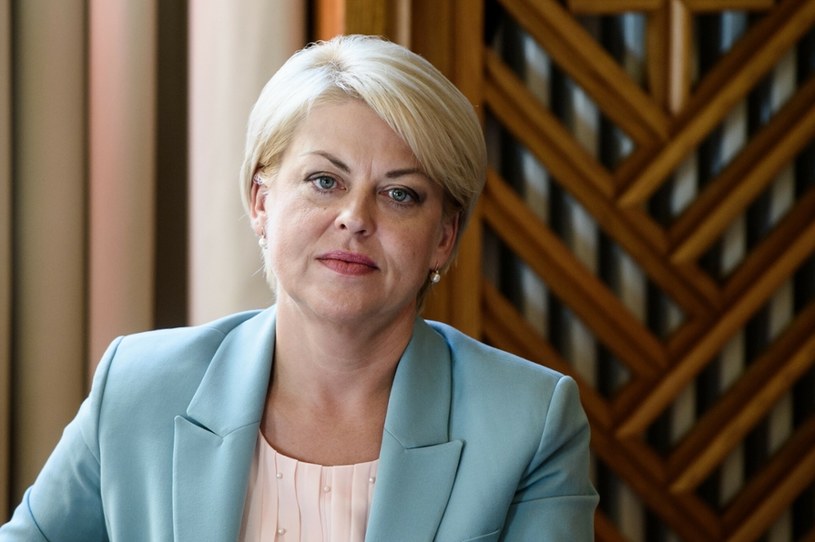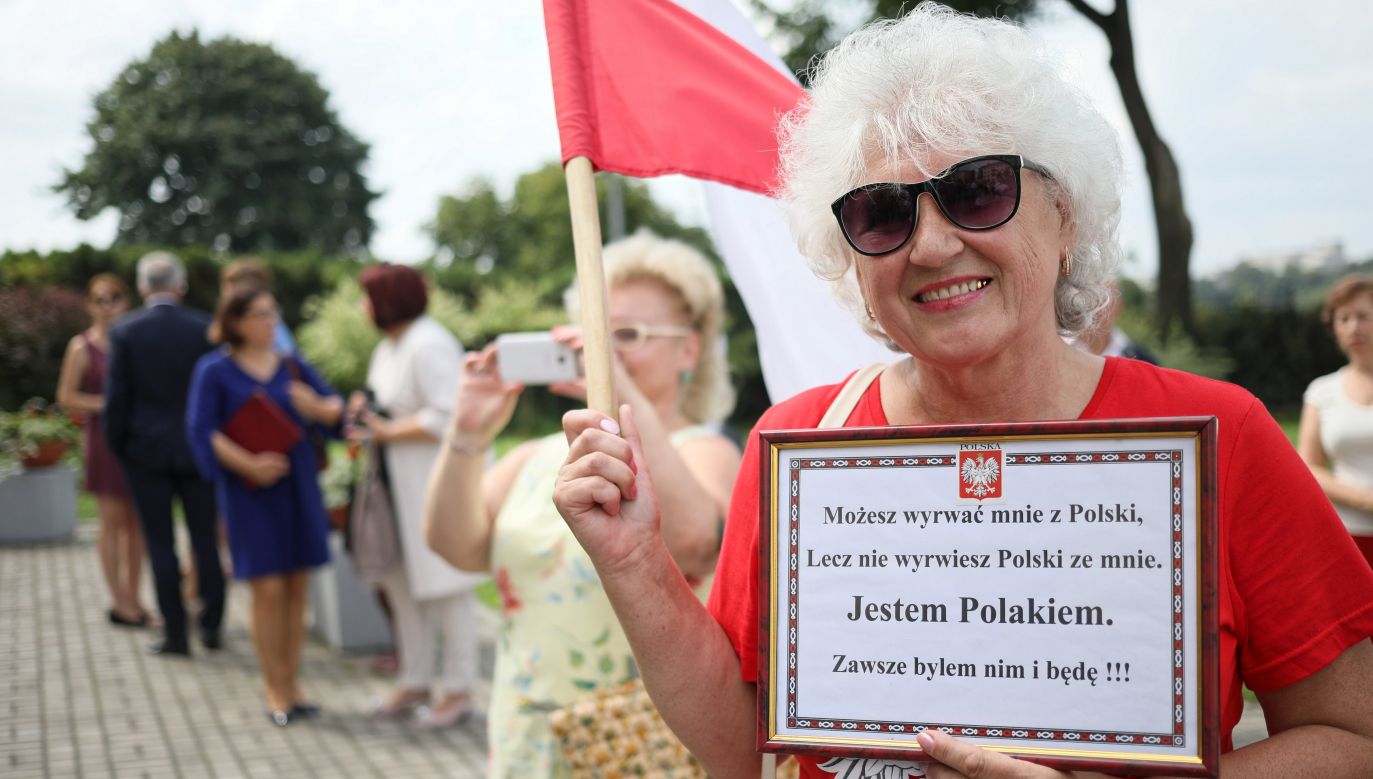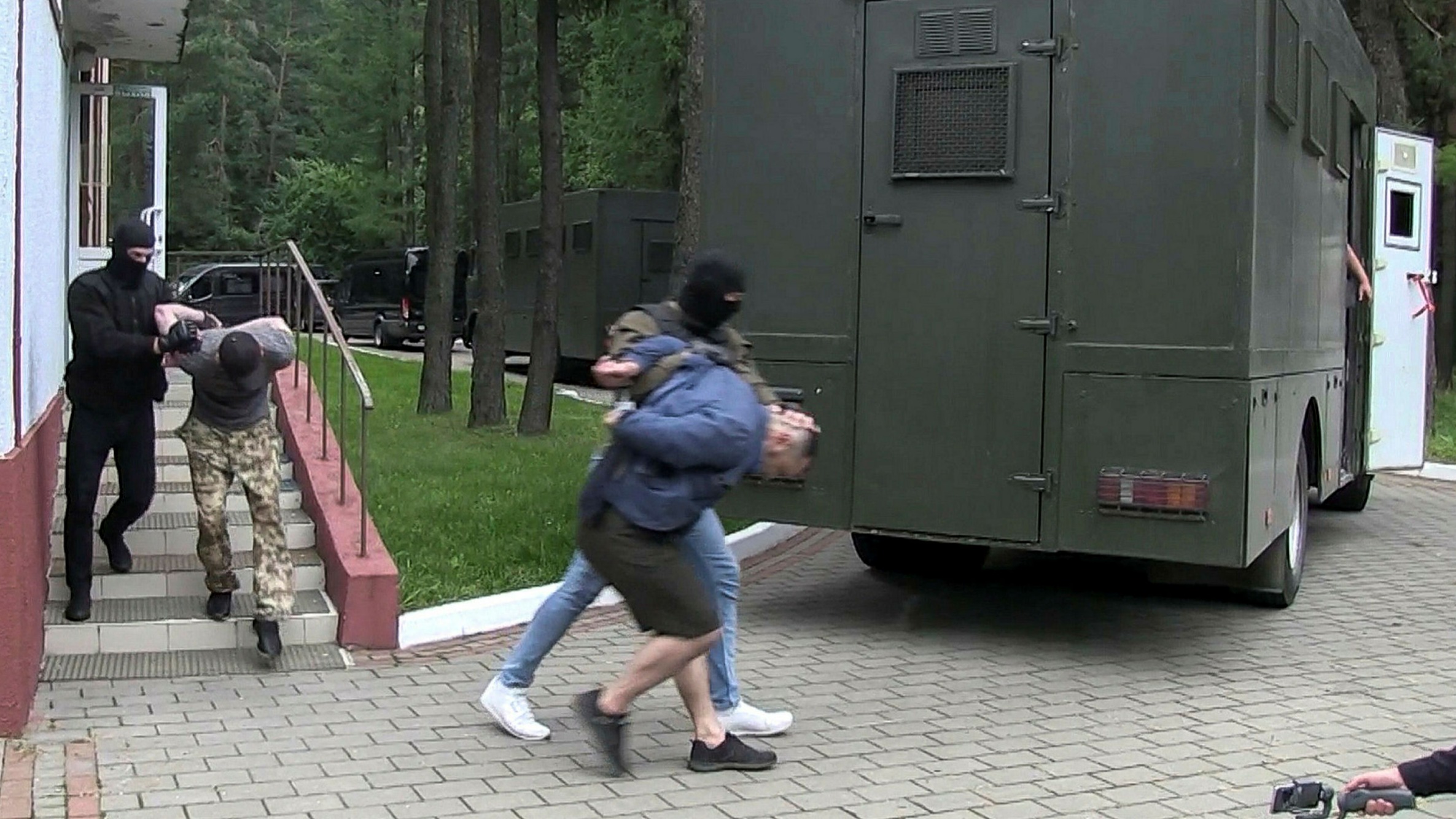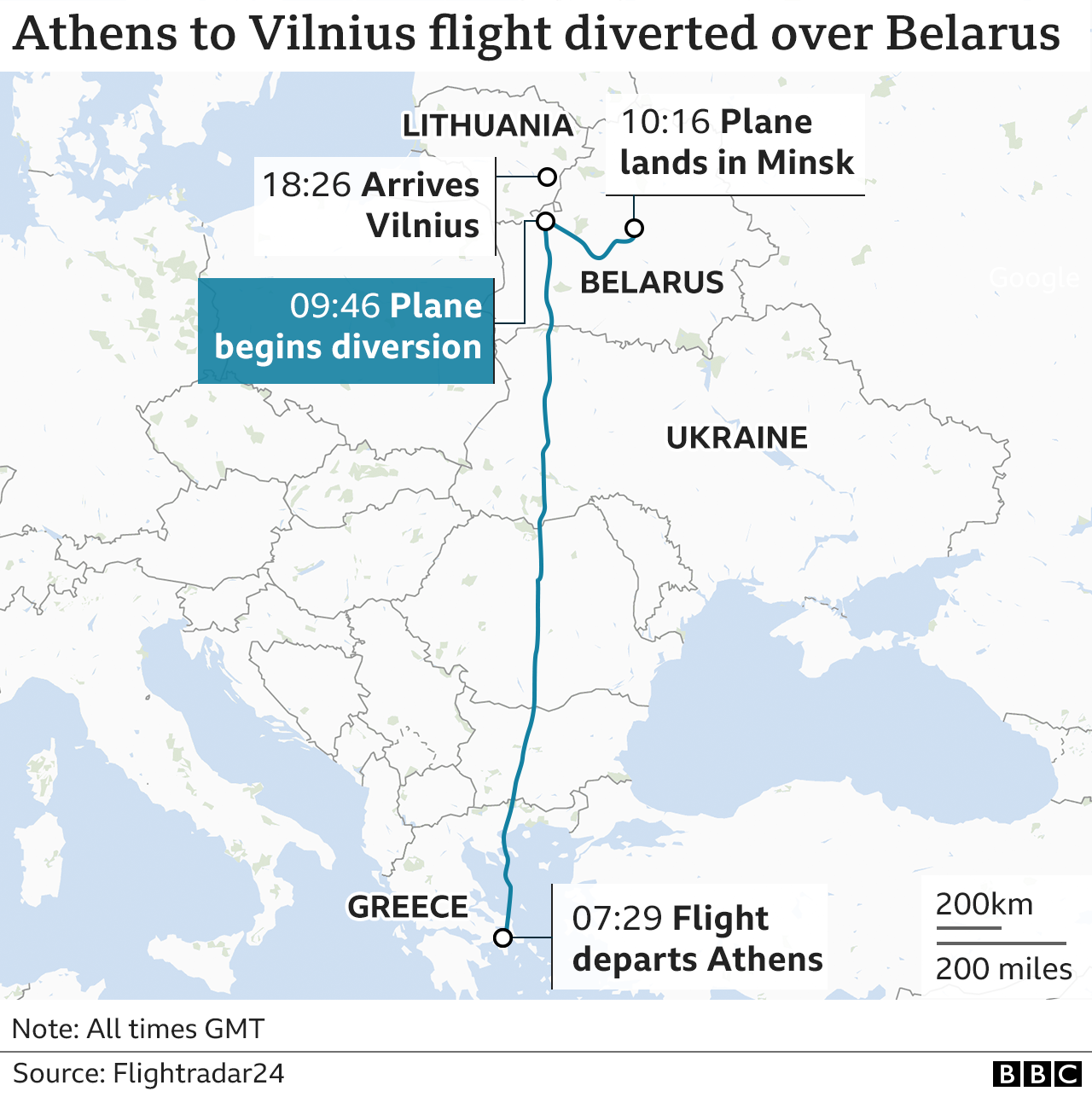|
|
Post by Jaga on May 23, 2021 15:04:59 GMT -7
Lukashenko and Belarus is constantly in news in Poland because he is imprisoning oppositions, people who are part of Polish Belarussian movement and his political opponents. He is doing this more openly than ever. I wonder whether he is a part new totalitarian leaders that seem to emerge all around the world like Trump, Maduro from Venezuela (5 mln people left the country), Putin, Kaczynski and.... so many more. www.npr.org/2021/05/23/999603575/ryanair-flight-carrying-opposition-journalist-forced-to-land-in-belarusA Ryanair Flight Carrying An Opposition Journalist Is Forced To Land In BelarusAuthorities in Belarus ordered a Ryanair flight to make an emergency landing in the capital city of Minsk, after reports that a bomb was on board the aircraft. Officials then boarded the plane and arrested Roman Protasevich, the former editor and founder of an opposition blog and social media channel. No explosives were found on the plane. The flight, which had taken off in Athens and was on its way to Lithuania, was just leaving Belarusian airspace when the bomb was reported. The Belarusian regime says it then sent a scrambled fighter jet to escort the flight to the Minsk airport. The Ryanair flight made a kind of U-turn just before the Lithuanian border before heading back toward Minsk, according the site Flightradar24. It was closer to the Vilnius airport in Lithuania than Minsk at the time. PHOTOS: Belarus' Massive And Unprecedented Protests THE PICTURE SHOW PHOTOS: Belarus' Massive And Unprecedented Protests The act has drawn condemnation from European leaders, demanding an explanation. Lithuania's president said the Belarusian "regime is behind the abhorrent action" and called on NATO and the European Union to respond, while Greek Prime Minister Kyriakos Mitsotakis said, "We demand all passengers' immediate release." Polish Prime Minister Mateusz Morawiecki called the incident a "hijacking" and called for immediate sanctions on Belarus. |
|
|
|
Post by pieter on May 24, 2021 11:25:51 GMT -7
A bizar and unacceptable happening
|
|
|
|
Post by pieter on May 24, 2021 15:08:00 GMT -7
|
|
|
|
Post by pieter on May 24, 2021 15:08:22 GMT -7
|
|
|
|
Post by pieter on May 24, 2021 15:10:27 GMT -7
|
|
|
|
Post by pieter on May 24, 2021 15:14:48 GMT -7
|
|
|
|
Post by pieter on May 24, 2021 15:18:47 GMT -7
|
|
|
|
Post by pieter on May 24, 2021 15:20:30 GMT -7
|
|
|
|
Post by pieter on May 24, 2021 15:25:20 GMT -7
|
|
|
|
Post by pieter on May 24, 2021 15:27:06 GMT -7
|
|
|
|
Post by Jaga on May 24, 2021 23:12:43 GMT -7
Pieter, I hope Roman would survive this sudden imprisonment and would be released. Belarus also started anti-Polish campaign. leaders of Polish-belarussian movements are arrested in bad conditions. People can be even arrested for wearing red-white socks (polish colors), which is simply crazy.
|
|
|
|
Post by pieter on May 25, 2021 13:36:35 GMT -7
Jaga,
Is this anti-Polish campaign, arresting leaders of Polish-belarussian movements and arresting people for wearing red-white socks (polish colors) a form of ethnic labeling and Polonophobia, anti-Polonism, (Polish: Antypolonizm), and thus anti-Polish sentiment or part of a Belarussian campaign against ethnic minorities in Belarus in general? In Belarus you have Russian (7.5%), Polish (3.1%), Ukrainian (1.7%), Jewish (0.1%), Armenian (0.1%), Lipka Tartar (0,1%), German-, Latvian-, and other minorities next to the ethnic native Belarussians.

Polish Organisations in Belarus – Living under Pressure
After the Second World War (1939-1945), a large number of Poles were forced to move to from the part of Eastern-Poland which became part of the Sovjet Belarussian Republic (other parts of Poland became part of the Lithuanian and Ukrainian Sovjet Republics). In exchange, Belarusians from the former Belastok Voblast, which was returned to Poland in 1945, after being occupied in 1939 were displaced to Belarus. Due to changes in the western border of Belarus and Poland after World War II (see territorial changes of Poland), the number of Poles in Belarus increased to more than 500,000 according to the first post-war census (1959) and to about 400,000 according to the 1999 census. Poles are now the third largest ethnic group in Belarus (see Polish minority in Belarus). There are around 15,000 of Lipka Tatars and about 10,000 of Ruska Roma (Russian Gypsies).
en.wikipedia.org/wiki/Poles_in_Belarus
Minsk’s anti-Polish campaign
The Polish diaspora in Belarus is relatively large, amounting to over 300,000 people, and it is well-organised. The descendants of Poles, who found themselves in Belarus as a result of border changes after World War II, strive to remember their ancestors and heritage. They continue to cultivate the Polish language, culture, and traditions, also through the membership in such organisations as the Union of Poles in Belarus.
The recent arrest and sentencing of the known Polish activist and Chairwoman of the Union of Poles in Belarus, Andżelika Borys, and the detention of a journalist, blogger and the Union’s member, Andrzej Poczobut, are part of a growing campaign of harassment and persecution orchestrated by the authorities in Minsk against the Polish diaspora.

Chairwoman of the Union of Poles in Belarus Andżelika Borys
The latest round of repressions against Poles has been launched with offensive investigations into the Polish educational institutions and an aggressive anti-Polish campaign about history and its false interpretation. And the Belarusian authorities’ provocative and threatening actions against the Polish minority are likely to continue.
The behaviour of the authorities in Minsk is all the more surprising as it violates the centuries-old Belarusian tradition of tolerance and the multicultural character of the country. Belarus prides itself on rich and historic freedom, tolerance and republican traditions dating back to the 15th-18th century Polish-Lithuanian Commonwealth, which were its trademark prior to the country falling under the communist yoke.

Polish people in Belarus demonstrate for their rights as ethnic Poles in Belarus
emerging-europe.com/voices/human-and-minority-rights-violations-in-belarus-must-end-immediately/
According to Encyclopedia Britannica Ethnic Belarusians make up about four-fifths of the country’s population. Russians, many of whom migrated to the Belorussian S.S.R. in the 1960s, ’70s, and ’80s, form the second largest ethnic group, accounting for roughly one-tenth of the population. Most of the remainder are Poles and Ukrainians, with much smaller numbers of Jews, Latvians, Lithuanians, and Tatars. Before World War II (1939–45), Jews constituted the second largest group in the republic (and more than half the urban population); the genocide of European Jewry and postwar emigration nearly eliminated Jews from the republic.
Both Belarusian and Russian are official languages of Belarus. Belarusian, which is central to the concept of national identity, is an East Slavic language that is related to both Russian and Ukrainian, with dialects that are transitional to both. It is written in a Cyrillic alphabet and has loanwords from both Polish and Russian, which is reflective of the region’s history. An older form of Belarusian was the official language of the grand duchy of Lithuania, of which present-day Belarus was an important component.
In the early 21st century more people, mainly Russians and other eastern Europeans, were immigrating to Belarus than were leaving the country. Nevertheless, this net gain in migrants did not offset the overall population decline.Government and societyConstitutional frameworkA new constitution that characterized the republic as a “democratic, social state” and guaranteed a broad range of rights and freedoms entered into force in Belarus in March 1994. It was based on the separation of legislative, executive, and judicial powers. Under the 1994 constitution, deputies were elected by universal adult suffrage for five-year terms to the government’s highest legislative body, the Supreme Soviet, which confirmed the budget, called for national elections and referenda, and was responsible for domestic, foreign, and military policy. Following the passage of a referendum (whose legitimacy was questioned by many Belarusians and by much of the international community) in November 1996, however, the constitution was revised to greatly expand the powers of the president. Thus, Pres. Alexander Lukashenko, who had been elected to the office in 1994, gained the right to prolong his term in office and to rule by decree. The amended constitution also greatly diminished the powers of a reconstituted parliament, the bicameral National Assembly. Pro-Lukashenko candidates predominated in subsequent legislative elections, which were deemed irregular or undemocratic by international observers. Alexander Grigoryevich Lukashenko or Alyaksand(а)r Ryhoravich Lukashenka in Belarusian (born 31 August 1954) is a Belarusian politician who has served as the first and current president of Belarus since the establishment of the office on 20 July 1994. Prior to his political career, Lukashenko worked as director of a state farm (sovkhoz), and served in the Soviet Border Troops and in the Soviet Army.Under the terms of the constitution, the president, who is the head of state, is popularly elected for a five-year term. The president appoints the prime minister, who nominally is the head of government but, in effect, is subordinate to the president. The National Assembly consists of the Council of the Republic and the House of Representatives. Members of the Council serve four-year terms; most are elected by regional councils, but a small number are appointed by the president. Members of the House are popularly elected to serve four-year terms.Belarus in the 21st centuryThe 2001 presidential elections were not recognized as free and fair by Western observers, and in October 2004 Lukashenko sponsored another successful referendum that allowed the president to serve for more than two terms. In 2006 the United Democratic Forces, a group of opposition parties and nongovernmental associations, backed pro-democracy candidate Alyaksandr Milinkevich in the presidential race, but Lukashenko was reelected with nearly 83 percent of the vote, according to the official count. Denouncing the results, opposition groups within Belarus as well as international observers accused the president of wielding his exceptional powers during the campaign to manipulate the media and intimidate his opponents; indeed, it was reported that some members of the opposition campaign teams had been detained and beaten. Protesters camped out in a public square in Minsk for several days following the election, but this and other demonstrations were broken up by the police. Another opposition presidential candidate, Alyaksandr Kazulin, was arrested at one such demonstration and imprisoned. In the September 2008 parliamentary elections the government reported a high voter turnout, with about three-fourths of eligible voters participating, but the opposition delegates did not win any seats. International monitors declared that the election could not be considered free and fair, and protests again were staged in the centre of Minsk. Alexander Grigoryevich Lukashenko or Alyaksand(а)r Ryhoravich Lukashenka in Belarusian (born 31 August 1954) is a Belarusian politician who has served as the first and current president of Belarus since the establishment of the office on 20 July 1994. Prior to his political career, Lukashenko worked as director of a state farm (sovkhoz), and served in the Soviet Border Troops and in the Soviet Army.Under the terms of the constitution, the president, who is the head of state, is popularly elected for a five-year term. The president appoints the prime minister, who nominally is the head of government but, in effect, is subordinate to the president. The National Assembly consists of the Council of the Republic and the House of Representatives. Members of the Council serve four-year terms; most are elected by regional councils, but a small number are appointed by the president. Members of the House are popularly elected to serve four-year terms.Belarus in the 21st centuryThe 2001 presidential elections were not recognized as free and fair by Western observers, and in October 2004 Lukashenko sponsored another successful referendum that allowed the president to serve for more than two terms. In 2006 the United Democratic Forces, a group of opposition parties and nongovernmental associations, backed pro-democracy candidate Alyaksandr Milinkevich in the presidential race, but Lukashenko was reelected with nearly 83 percent of the vote, according to the official count. Denouncing the results, opposition groups within Belarus as well as international observers accused the president of wielding his exceptional powers during the campaign to manipulate the media and intimidate his opponents; indeed, it was reported that some members of the opposition campaign teams had been detained and beaten. Protesters camped out in a public square in Minsk for several days following the election, but this and other demonstrations were broken up by the police. Another opposition presidential candidate, Alyaksandr Kazulin, was arrested at one such demonstration and imprisoned. In the September 2008 parliamentary elections the government reported a high voter turnout, with about three-fourths of eligible voters participating, but the opposition delegates did not win any seats. International monitors declared that the election could not be considered free and fair, and protests again were staged in the centre of Minsk.
Meanwhile, beginning in 2002, Belarus’s relations with Russia had deteriorated, partly over the desire of Gazprom, the Russian state-owned natural gas company, to raise the price of gas exported to Belarus to world levels. Another source of discord was Russia’s military conflict with Georgia in 2008, as Lukashenko failed to follow Russia’s lead in recognizing the independence of the breakaway Georgian republics of Abkhazia and South Ossetia. Nevertheless, Belarus remained in the Russian orbit through its membership in Russian-backed regional organizations, including the Collective Security Treaty Organization and the Eurasian Economic Community, as well as—to a lesser extent—the Union State and the CIS.
David R. Marples
Lukashenko improved relations with the EU in 2008 when he agreed to the release of several political prisoners, including Kazulin, and appeared to adopt a more tolerant attitude toward the nongovernmental media. He also supported economic reforms, including the privatization of some state companies and the encouragement of foreign investment. The EU subsequently suspended a restriction that since 2006 had banned the president and most of his entourage from entering the EU. In 2009 Belarus joined the EU’s Eastern Partnership Program, which promotes ties between the EU and a number of countries in eastern Europe and the Caucasus region. However, by early 2010 the Belarusian government’s continuation of various repressive policies had renewed concerns in some EU capitals.
Lukashenko easily won another term as president in elections held in late 2010, but again there were protests by opposition supporters in Minsk on the fairness of the voting, as well as objections by EU and U.S. observers. As in 2006, large numbers of demonstrators were arrested or detained by authorities, as were most of the opposition candidates for president.
In April 2011 a bomb exploded on a crowded metro platform in Minsk, killing 12 and injuring more than 100. The blast heightened tensions in the country, which was struggling with a soaring budget deficit and an ongoing foreign exchange crisis. Sharply declining foreign currency reserves led to a devaluation of the Belarusian rubel, which shed more than 60 percent of its value against the U.S. dollar during 2011. The plummeting rubel triggered a wave of inflation, which peaked at almost 110 percent in January 2012. The Belarusian central bank responded by raising interest rates to 45 percent, the highest in the world at the time. A $3 billion bailout program, begun in 2011 and primarily financed by Russia, helped to stabilize the economy.
The economic crisis did little to weaken Lukashenko’s regime, and opposition parties boycotted parliamentary elections held in September 2012. The elections, which Western observers characterized as unfair and lacking transparency, saw politicians allied with Lukashenko returned to every one of the parliament’s 110 seats.
Human rights and corruption

Belarus's Democracy Index rating is the lowest in Europe, the country is labelled as "not free" by Freedom House, as "repressed" in the Index of Economic Freedom, and is rated as the worst country for press freedom in Europe in the 2013–2014 Press Freedom Index published by Reporters Without Borders, which ranks Belarus 157th out of 180 nations. The Belarusian government is also criticized for human rights violations and its persecution of non-governmental organisations, independent journalists, national minorities, and opposition politicians. Lukashenko announced a new law in 2014 that will prohibit kolkhoz workers (around 9% of total work force) from leaving their jobs at will—a change of job and living location will require permission from governors. The law was compared with serfdom by Lukashenko himself. Similar regulations were introduced for the forestry industry in 2012. Belarus is the only European country still using capital punishment having carried out executions in 2011.

The judicial system in Belarus lacks independence and is subject to political interference. Corrupt practices such as bribery often took place during tender processes, and whistleblower protection and national ombudsman are lacking in Belarus's anti-corruption system. However, there is a political will to fight against corruption in the government, and the government has made some progress in combating corruption, such as minimizing tax regulations in order to improve transparency in the tax office.

Detentions in Minsk near the KGB headquarters. Source: euroradio.fm
On September 1, 2020 the Office of the United Nations High Commissioner for Human Rights declared that its experts received reports of 450 documented cases of torture and ill-treatment of people who were arrested during the protests following the presidential election. The experts also received reports of violence against women and children, including sexual abuse and rape with rubber batons.[178] At least three detainees suffered injuries indicative of sexual violence in Okrestino prison in Minsk or on the way there. The victims were hospitalized with intramuscular bleeding of the rectum, anal fissure and bleeding, and damage to the mucous membrane of the rectum. In an interview from September 2020 Lukashenko claimed that detainees faked their bruises, saying, "Some of the girls there had their butts painted in blue".

Cheers,
Pieter
|
|
|
|
Post by karl on May 25, 2021 17:12:19 GMT -7
Jaga
These as an action that has occured is indeed a very questionable action upon the part of the Government of Belarus. For to force down a commercial aircraft upon entering the air space of Belarus to then arrest one individual under the pretense of a bomb is a bit thin when in actual events, it is a political action.
The question though, is what is to be done about this and under which International authority?
Karl
|
|
|
|
Post by Jaga on May 26, 2021 20:54:36 GMT -7
|
|












